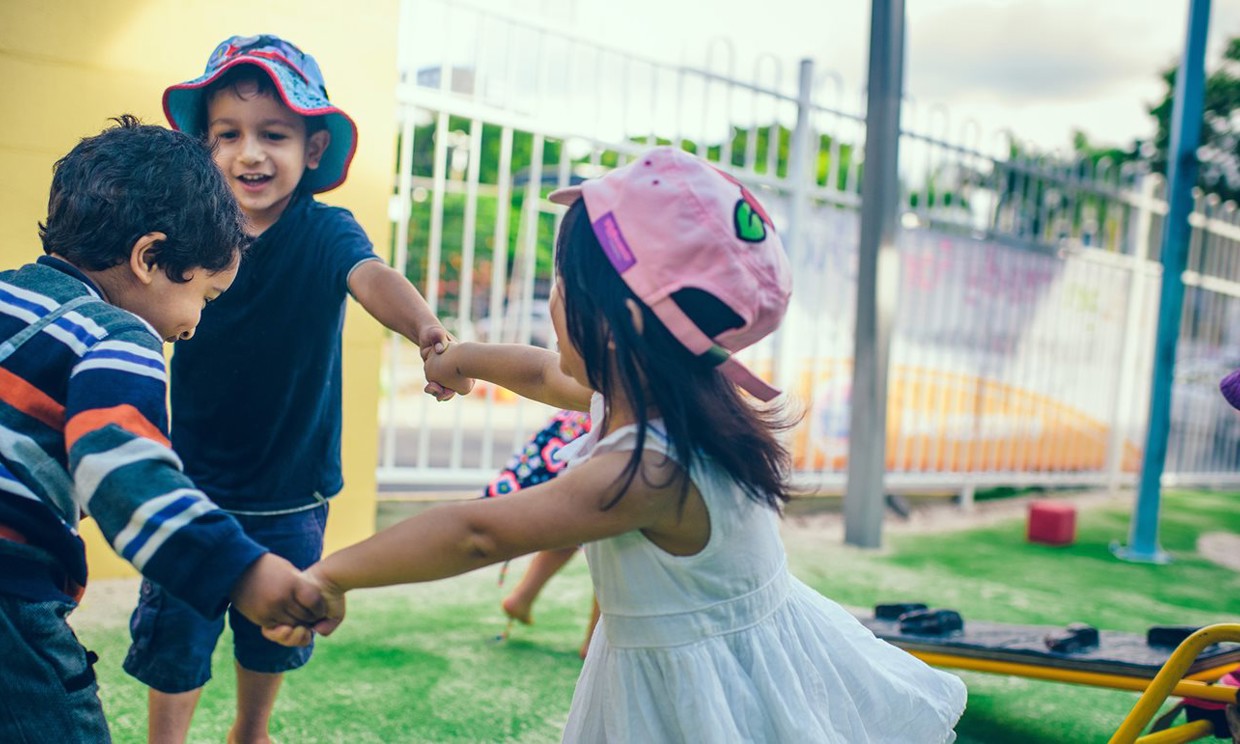Physical activity plays a vital role in a child’s overall health and wellbeing, but knowing how much energetic play, rest and sleep a child needs is a challenge for parents.
Recognising the relationship between activity levels and early childhood outcomes, the Australian Government has released a new set of guidelines for parents called the Australian 24 Hour Movement Guidelines for the Early Years.
Getting the right balance of sleep, rest and physical activity is associated with better growth, stronger muscles and bones, better learning and thinking, better mental, emotional and social well-being, better motor skills, healthier weight and reduced injuries.
As children grow, they gradually need more active play, less rest and less sleep. Let’s take a look at the guidelines for each age group.
Having a strong sense of wellbeing provides children with confidence and optimism, and maximises their learning potential. It encourages children to explore and interact and is also correlated with resilience and the ability to cope with stress.
All Goodstart centres understand the vital role that physical wellbeing plays in early childhood development and support children to engage in physical activity in a number of ways:
Recognising the relationship between activity levels and early childhood outcomes, the Australian Government has released a new set of guidelines for parents called the Australian 24 Hour Movement Guidelines for the Early Years.
Getting the right balance of sleep, rest and physical activity is associated with better growth, stronger muscles and bones, better learning and thinking, better mental, emotional and social well-being, better motor skills, healthier weight and reduced injuries.
As children grow, they gradually need more active play, less rest and less sleep. Let’s take a look at the guidelines for each age group.
How much physical activity do children need?
- Infants (Birth to one year) - physical activity, particularly through supervised floor-based play in safe environments should be encouraged from birth. For those not yet mobile, 30 minutes of tummy time including reaching and grasping, pushing and pulling, and crawling spread throughout the day during awake periods is encouraged.
- Toddlers (1 to 2 years) - at least three hours a day doing a variety of physical activities including energetic play such as running, jumping and twirling spread throughout the day.
- Pre-schoolers (3 to 5 years) - at least three hours a day in a variety of physical activities, of which one hour is energetic play such as running, jumping and kicking and throwing, spread throughout the day.
How much sedentary behaviour is ok for children?
- Infants (Birth to one year) should not be restrained for more than one hour at a time (e.g. in a stroller, car seat or high chair). Infants should also not spend any time watching television or using other electronic media and instead, when sedentary, parents are encouraged to engage with them through activities such as reading, singing, puzzles and storytelling.
- Toddlers (aged 1-2 years) should not be restrained for more than one hour at a time or sit for extended periods. For those toddlers younger than two years, screen time is not recommended during sedentary periods. For those aged two years, screen time should be no more than one hour in total throughout the 24-hour period. When toddlers are sedentary, parents encouraged to engage with them through activities such as reading, singing, puzzles and storytelling.
- Pre-schoolers (aged 3-5 years) should not be restrained for more than one hour at a time or sit for extended periods. Sedentary screen time should be no more than one hour in total throughout the 24-hour period. When pre-schoolers are sedentary, parents are encouraged to engage with them through activities such as reading, singing, puzzles and storytelling.
How much sleep do children need?
- Infants (Birth to one year) are recommended to have 14 to 17 hours (for those aged 0-3 months) and 12 to 16 hours (for those aged 4-11 months) of good quality sleep, including naps during the 24 hour period.
- Toddlers (aged 1-2 years) are recommended to have from 11 to 14 hours of good quality sleep, including naps during the 24-hour period with consistent sleep and wake-up times.
- Pre-schoolers (aged 3-5 years) are recommended to have 10 to 13 hours of good quality sleep, which may include a nap, with consistent sleep and wake-up times.
Supporting physical wellbeing in childcare
Having a strong sense of wellbeing provides children with confidence and optimism, and maximises their learning potential. It encourages children to explore and interact and is also correlated with resilience and the ability to cope with stress.All Goodstart centres understand the vital role that physical wellbeing plays in early childhood development and support children to engage in physical activity in a number of ways:
- By providing environments which encourage physical play and sensory exploration
- By planning for energetic physical activity including dance, drama, movement and games
- By providing a wide range of tools and materials to develop children’s fine and gross motor skills


